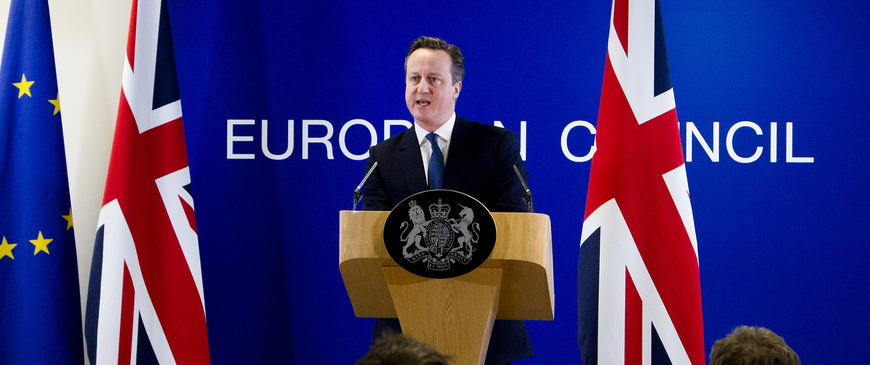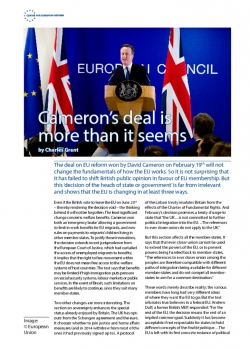
Cameron's deal is more than it seems
The deal on EU reform won by David Cameron on February 19th will not change the fundamentals of how the EU works. So it is not surprising that it has failed to shift British public opinion in favour of EU membership. But this ‘decision of the heads of state or government’ is far from irrelevant and shows that the EU is changing in at least three ways.
Even if the British vote to leave the EU on June 23rd – thereby rendering the decision void – the thinking behind it will not be forgotten. The least significant change concerns welfare benefits. Cameron won both an ‘emergency brake’ allowing a government to limit in-work benefits for EU migrants, and new rules on payments to migrants’ children living in other member-states. To justify these innovations, the decision extends recent jurisprudence from the European Court of Justice, which had curtailed the access of unemployed migrants to benefits; it implies that the right to free movement within the EU does not mean free access to the welfare systems of host countries. The text says that benefits may be limited if high immigration puts pressure on social security systems, labour markets or public services. In the event of Brexit, such limitations on benefits are likely to continue, since they suit many member-states.
Two other changes are more interesting. The section on sovereignty enhances the special status already enjoyed by Britain. The UK has opt-outs from the Schengen agreement and the euro. It chooses whether to join justice and home affairs measures (and in 2014 withdrew from most of the ones it had previously signed up to). A protocol of the Lisbon treaty insulates Britain from the effects of the Charter of Fundamental Rights. And February’s decision promises a treaty change to state that "the UK…is not committed to further political integration into the EU…The references to ever closer union do not apply to the UK."
But this section affects all the member-states. It says that that ever closer union cannot be used to extend the powers of the EU, or to prevent powers being handed back to member-states. "The references to ever closer union among the peoples are therefore compatible with different paths of integration being available for different member-states and do not compel all member-states to aim for a common destination."
These words merely describe reality; the various members have long had very different ideas of where they want the EU to go. But the text infuriates true believers in a federal EU. Andrew Duff, a former British MEP, responded: "For the rest of the EU, the decision means the end of an implied common goal. Suddenly it has become acceptable if not respectable for states to hold different concepts of the finalité politique…The EU is left with its first concrete instance of political disintegration entrenched at a constitutional level." But however the British vote, the principles enshrined in the decision will surely endure; few European leaders are Duffian federalists.
The other key section covers relations between the euro countries and the others. The British worry that the eurozone may caucus and push through rules that damage the single market in financial services or the City of London. The euro countries are concerned that the British may try to veto financial regulation – or somehow seek to block eurozone integration. The decision defines some sensible principles to govern relations between euro and non-euro countries:
- Discrimination based on a member’s currency is prohibited. Laws concerning the eurozone "shall respect the internal market [and] the competences, rights and obligations of member-states whose currency is not the euro".
- Members outside the euro "shall not impede the implementation of legal acts directly linked to the functioning of the euro area and shall refrain from measures which could jeopardise the attainment of the objectives of economic and monetary union".
- Countries outside the euro will not have to contribute to eurozone bail-outs.
- The Eurogroup (informal meetings of ministers from euro countries) should not intrude on the role of the Council, where the governments co-ordinate economic policy and take decisions, including for the eurozone.
These principles are not particularly controversial (though Sylvie Goulard, a French MEP, found them "seriously imbalanced to the detriment of the eurozone"). They will go into the treaties if the British vote to remain – and the treaties will then recognise, for the first time, that there are two sorts of member, euro and non-euro. Even if the British leave, many governments will want to preserve these ground-rules for relations between euro-ins and euro-outs.
One part of this section was bitterly fought over. The British wanted the right to have financial regulations that differed from those of the eurozone. The French, backed by Germany, many eurozone governments and the European Central Bank, feared that such differentiation could lead to laxly-regulated UK firms undercutting continental ones, or to financial instability.
An early version of the decision pleased the British by saying that "different sets of Union rules may have to be adopted in secondary law". The French claimed that the wily Sir Jon Cunliffe, a deputy governor of the Bank of England and a former permanent representative to the EU, had ‘got at’ the Danish and Polish officials drafting the text; since their countries were outside the euro, they (in the French narrative) had an imperfect understanding of the issues at stake.
The wording of the final compromise maintains the status quo, leaving open for future battles the degree to which UK regulation may diverge from that of the eurozone. The text says that all financial institutions must apply the single rulebook. Laws applied by the ECB, the Single Resolution Board or other EU bodies "may need to be conceived in a more uniform manner than corresponding rules to be applied by national authorities" of countries outside the banking union. "To this end, specific provisions within the single rulebook and other relevant instruments may be necessary, while preserving the level playing field and contributing to financial stability." The text also says that unless member-states choose to join common mechanisms, they are responsible for implementing their own measures on supervision, resolution and macro-prudential stability.
Cameron also won a second ‘emergency brake’: a country outside the banking union may pull the brake if it believes the above-mentioned principles have been breached. The Council and EU institutions would then seek to resolve the matter within a "reasonable time". The European Council may be convened, but the brake is not a veto and ultimately the Council would decide the issue by majority vote.
Some federalists fear that Cameron’s renegotiation establishes a dangerous precedent. "By transforming the right of a state to leave the EU into the right to blackmail partners with the threat of leaving, Cameron has opened Pandora’s box", wrote Goulard. She worries that other members will now try to pick and choose the bits of the EU they like. Such fears are probably exaggerated. Most other countries enjoy much less leverage than the UK. According to one EU official, "if Hungary held a referendum and threatened to leave, many people would not be that bothered."
In any case, the specifics of Cameron’s deal contain much good sense. They recognise the reality that in an EU of 28 plus countries, more differentiated – and complicated – structures will be needed to hold the Union together and enable the very different preferences of the member-states to be reconciled. Federalists do their cause no credit by clinging to conservative and traditional ideas of uniformity.
Charles Grant is director of the Centre for European Reform.

